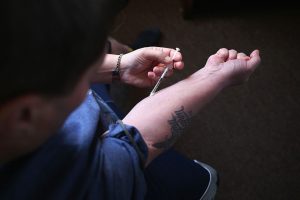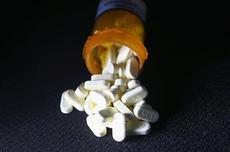The Staggering Costs, Monetary and Otherwise, of Substance Abuse
A new report from the Surgeon General says the country spends $442 billion a year in dealing with drug and alcohol abuse.

Substance abuse seems to be one of the few areas where leaders on both sides of the aisle agree their is a problem and seem committed to fixing it. JOHN MOORE/GETTY IMAGES
There are so many issues dividing America right now. But there is a terrible scourge that both national political parties agree on: we’ve become a nation of drug and alcohol addicts, and it is destroying millions of lives and families, and harming countless communities and cities. The only question left to debate is what to do about it.
Marijuana is not the problem here, and neither is a six-pack of beer on a Sunday afternoon, although the latter isn’t helping the obesity epidemic, but that’s a different story.
I’m talking about the horrific problem of serious drug and alcohol misuse chronicled in shocking fashion in a recent report from the U.S. Surgeon General. There were 27 million people in America last year who self-reported the misuse of illegal drugs or opioid-based prescription drugs, while another 66 million reported binge-drinking in the past month.
Those sorts of numbers are hard to fathom. The economic toll is beyond staggering. The yearly annual economic impact from the misuse of prescription drugs, illicit drugs or alcohol is $442 billion. Think about that number for a second. That is an economy-wrecking number. That sort of number means that this problem is taking root everywhere.
“Alcohol and drug misuse and related disorders are major public health challenges that are taking an enormous toll on individuals, families, and society,” the authors of the Surgeon General’s report wrote. “Neighborhoods and communities as a whole are also suffering as a result of alcohol- and drug-related crime and violence, abuse and neglect of children, and the increased costs of health care associated with substance misuse.”
We are witnessing a war on children. When parents and adults misuse drugs and alcohol or look the other way as family members do so, it is nearly always the children who suffer the brunt of the impacts all around them. Crime and violence, abuse and neglect – these are downstream effects that land most harshly and directly on children in families and communities who have no voice and can’t adequately defend themselves from the onslaught and the economic and emotional toll it brings through the door.
RELATED CONTENT
Report Shows Teen Opioid Use Declining
It’s unclear what is driving the trend.

Addiction also powerfully strikes children first, as their brains are developing. Once upon a time, decades ago, tobacco industry executives recognized this simple truth. Nicotine, for instance, starts the addiction process in an adolescent brain within the first 10 cigarettes, which is why they gave away free ten-packs near playgrounds.
“Most Americans know someone with a substance use disorder, and many know someone who has lost or nearly lost a family member as a consequence of substance misuse,” the Surgeon General’s report said. “Yet, at the same time, few other medical conditions are surrounded by as much shame and misunderstanding as substance use disorders.”
Thankfully, especially in light of how much is dividing our country right now, national politicians on the left and right are finally recognizing the monumental problem facing us. The Surgeon General’s report was a clarifying wake up call.
“For too long, we tended to think of substance abuse as a moral failing rather than the dangerous disease that is,” Sen. Sheldon Whitehouse, D-R.I., said in response to the report. “That’s starting to change. The Surgeon General’s report and other new research are showing how substance disorders work and how best to treat them.”
Whitehouse has spoken out often on the subject of treating drug and alcohol addiction as a disease that can be treated, rather than as a moral failure. Congress agreed, and passed legislation that alters the way the federal government approaches addiction. Federal health and science agencies now focus on drug and alcohol addiction in a public health frame.
“Addiction is a powerful illness and recovery is a long and difficult path, but we are making progress,” Whitehouse said.
President-elect Donald Trump appears to be taking a similar approach on the treatment side of the issue, which makes it more likely that his administration and the GOP-controlled Congress will approach this issue as a public health problem that can be solved.
– Jeff Nesbit, US News & World Report
